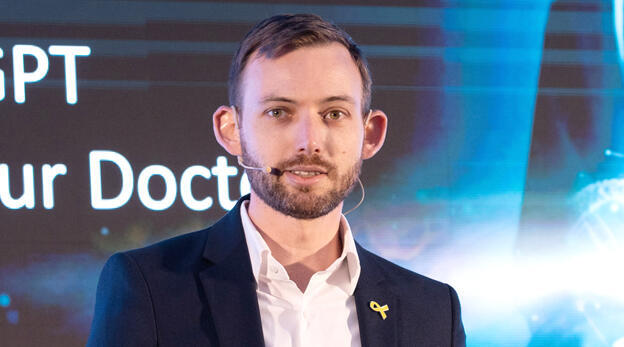
Mind the Tech London 2024
"The future of medicine lies in the successful combination of human intelligence and artificial intelligence"
"The ability of artificial intelligence to develop and help in many cases is impressive," said Dr. Edward Itelman, a doctor in the cardiology department and AI researcher at Beilinson Hospital. "But there is no substitute for human intervention in medical care."
Dr. Edward Itelman
(Photo: Alex Kolomoyski)
"In an age where advanced technology penetrates every area of our lives, the question arises as to whether artificial intelligence systems like ChatGPT can change the world of medicine, and especially the medical decision-making process," said Dr. Edward Itelman, a doctor in the cardiology department and an artificial intelligence researcher at Beilinson Hospital, speaking at the Mind the Tech London conference.
"The field of medicine is changing rapidly with the introduction of artificial intelligence (AI), which brings with it significant improvements. Today, AI systems manage to pass medical tests, answer medical questions in forums and even provide more professional and sensitive answers than doctors in some cases," said Itelman.
"We recently conducted an experiment that sheds new light on this question, which produced surprising results," said Itelman. "The experiment included 40 cases of patients needing a heart valve replacement. There were two options: open heart surgery or valve implantation with the help of a catheter. The differences between the options are dramatic: open heart surgery involves a lot of pain, a long stay in the hospital and a long recovery, but it is the best solution for some patients, while the valve implantation with catheterization is easier in terms of pain and duration, but it has its own disadvantages.”
"The results were surprising. The GPT-4 model, the latest at the time, showed 100% accuracy in decision-making, indicating complete success, like a professional basketball player hitting every shot. In contrast, the GPT-3.5 model showed a tendency to prefer surgery over catheterization, which indicates a higher level of risk and perhaps over-enthusiasm, similar to that of a young doctor. The Google Bard model leaned in more conservative directions, sometimes choosing short-term safety over long-term results.
"The study was published in one of the leading journals in cardiology and seems to have been the first in the world to address this critical question. The question raised by this experiment is whether we are ready for ChatGPT to determine whether open heart surgery is needed. The answer is not simple. Our study showed that in theoretical questions with one clear answer, the most advanced models are right. But in medicine there are almost no cases with one clear answer," Itelman added.
"So can AI replace doctors? The answer is no. As technology advances, the line between human and machine capabilities becomes more blurred. However, it seems that in the foreseeable future, artificial intelligence will be used as a decision support tool for doctors, and not as a replacement for them. The main challenge will be to find the right balance between the technological advantages and the need for humane and empathetic care," said Itelman.
"While artificial intelligence brings great promise for improving medical care, it is not expected to replace the human doctor. Instead, it will change the doctor's role, allowing them to focus more on the human aspects of medicine, using advanced technological tools to make more informed decisions. The future of medicine lies in the successful combination of human intelligence and artificial intelligence," he concluded.
Watch his full presentation in the video above.
















